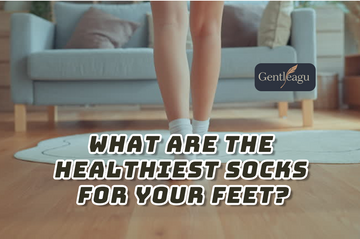What Are the Healthiest Socks for Your Feet?
Socks are more than just a wardrobe essential—they play a significant role in foot health. Choosing the right socks can help prevent common issues like blisters, odor, fungal infections, and even circulation problems. But what makes a sock "healthy"? The answer lies in its materials, design, and intended purpose. Let’s explore the healthiest sock options and why they matter for your feet.
Key Features of Healthy Socks
-
Moisture-Wicking:
- Socks that wick moisture away from the skin help prevent bacterial and fungal growth, reducing the risk of infections.
- Materials like bamboo viscose, merino wool, and technical synthetic blends are excellent for moisture control.
-
Breathability:
- Breathable socks allow air circulation to keep your feet cool and dry.
- Look for fabrics with natural ventilation, like bamboo and organic cotton.
-
Cushioning and Support:
- Proper cushioning absorbs shock and reduces pressure on the soles, essential for long hours of standing or physical activity.
- Compression socks can offer additional support for circulation, especially for those with conditions like varicose veins or diabetes.
-
Seamless Design:
- Socks with flat or seamless construction minimize irritation, especially for sensitive feet or conditions like diabetes.
-
Antimicrobial Properties:
- Antimicrobial treatments or naturally antibacterial materials like bamboo and merino wool help combat odor and keep feet fresh.
-
Fit:
- A snug fit prevents bunching, which can cause blisters, but socks should not be so tight that they cut off circulation.
Best Sock Materials for Foot Health
-
Bamboo:
- Naturally soft, moisture-wicking, and antimicrobial, bamboo socks are ideal for keeping feet comfortable and odor-free.
- Perfect for sensitive skin and those prone to foot odor or infections.
- Check out Bulk Sockery’s bamboo socks for sustainable and healthy options.
-
Merino Wool:
- Lightweight and temperature-regulating, merino wool is perfect for both hot and cold conditions.
- It’s also naturally antimicrobial, reducing odor buildup even after prolonged wear.
-
Organic Cotton:
- Hypoallergenic and breathable, organic cotton socks are a great choice for everyday comfort.
- Avoid conventional cotton, which retains moisture and can lead to damp, uncomfortable feet.
-
Synthetic Blends:
- High-performance synthetic materials like polyester and nylon are often used in athletic socks for their moisture-wicking properties and durability.
- Look for blends that incorporate natural fibers for added softness and comfort.
-
Copper-Infused Fabrics:
- Copper-infused socks have antimicrobial properties that reduce odor and promote skin health.
Socks for Specific Needs
-
Diabetic Socks:
- Designed with extra cushioning, seamless toes, and non-binding tops to improve circulation and reduce the risk of foot injuries.
- Often made with moisture-wicking and antimicrobial materials to prevent infections.
-
Athletic Socks:
- Moisture-wicking, cushioned, and breathable, athletic socks reduce blisters and provide support during high-impact activities.
- Look for arch support and reinforced heels and toes for durability.
-
Compression Socks:
- Ideal for improving circulation, especially for those with varicose veins, swelling, or who stand for extended periods.
- Graduated compression helps reduce fatigue and promote blood flow.
-
Therapeutic Socks:
- These include copper or silver-infused socks, which can have antimicrobial and healing benefits for conditions like athlete’s foot.
-
Eco-Friendly Socks:
- Made from sustainable materials like bamboo or organic cotton, these socks are healthy for your feet and the environment.
Why Bamboo Socks Are the Healthiest Option
Bamboo socks combine multiple health benefits into one versatile option:
-
Soft and Hypoallergenic:
- Gentle on sensitive or allergy-prone skin.
-
Moisture-Wicking and Antimicrobial:
- Keeps feet dry and odor-free, reducing the risk of infections.
-
Temperature-Regulating:
- Stays cool in summer and warm in winter, ensuring comfort year-round.
-
Eco-Friendly:
- Bamboo grows quickly with minimal resources, making it an excellent sustainable choice.
Explore our range of bamboo socks for a healthier and more sustainable alternative to traditional options.
Tips for Choosing the Healthiest Socks
-
Match the Activity:
- Use athletic socks for sports, compression socks for long travel or standing, and cushioned socks for daily wear.
-
Prioritize Fit:
- Ill-fitting socks can cause blisters, irritation, and discomfort.
-
Consider Climate:
- Lightweight, breathable socks for hot weather and thicker, insulated socks for winter.
-
Check for Seamless Construction:
- Particularly important for those with sensitive skin or medical conditions.
-
Choose Sustainable Options:
- Eco-friendly socks benefit both your feet and the environment.
Conclusion
Healthy socks are an investment in your foot health and overall comfort. Whether you’re battling sweaty feet, looking for athletic performance, or need extra support for medical conditions, there’s a perfect sock for you. Bamboo socks, with their moisture-wicking, antimicrobial, and eco-friendly properties, are a top choice for anyone seeking the healthiest option for their feet.
Ready to give your feet the care they deserve? Browse our collection of healthy bamboo socks today and discover the difference!
